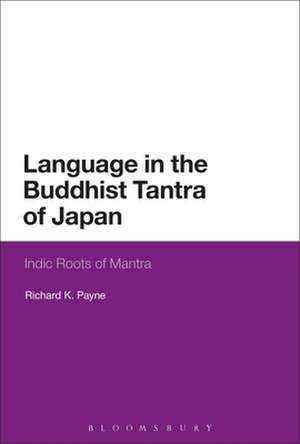Language in the Buddhist Tantra of Japan: Indic Roots of Mantra
Autor Richard K. Payneen Limba Engleză Paperback – 19 feb 2020
| Toate formatele și edițiile | Preț | Express |
|---|---|---|
| Paperback (1) | 224.48 lei 43-57 zile | |
| Bloomsbury Publishing – 19 feb 2020 | 224.48 lei 43-57 zile | |
| Hardback (1) | 715.50 lei 43-57 zile | |
| Bloomsbury Publishing – 8 aug 2018 | 715.50 lei 43-57 zile |
Preț: 224.48 lei
Preț vechi: 288.75 lei
-22% Nou
Puncte Express: 337
Preț estimativ în valută:
42.97€ • 46.69$ • 36.12£
42.97€ • 46.69$ • 36.12£
Carte tipărită la comandă
Livrare economică 21 aprilie-05 mai
Preluare comenzi: 021 569.72.76
Specificații
ISBN-13: 9781350152090
ISBN-10: 1350152099
Pagini: 256
Dimensiuni: 156 x 234 x 21 mm
Greutate: 0.36 kg
Editura: Bloomsbury Publishing
Colecția Bloomsbury Academic
Locul publicării:London, United Kingdom
ISBN-10: 1350152099
Pagini: 256
Dimensiuni: 156 x 234 x 21 mm
Greutate: 0.36 kg
Editura: Bloomsbury Publishing
Colecția Bloomsbury Academic
Locul publicării:London, United Kingdom
Caracteristici
Examines
the
Indic
roots
of
tantric
practices
and
extraordinary
language
in
Japanese
Buddhism
Notă biografică
Richard
K.
Payneis
Yehan
Numata
Professor
of
Japanese
Buddhist
Studies
at
the
Institute
of
Buddhist
Studies,
Graduate
Theological
Union,
Berkeley,
USA.
He
specializes
in
Japanese
tantric
Buddhism,
particularly
its
ritual
practices,
and
is
co-editor
ofHoma
Variations(2016).
Cuprins
Introduction1.
Extraordinary
Language
Use2.
Is
Language
Communication?:
Extraordinary
Language
in
the
face
of
Philosophy
of
Language3.
Indic
Understandings
of
Language-from
Vedas
to
Tantra4.
East
Asian
Understandings
of
Language5.
Emptiness
and
Cosmogenesis
in
the
Tantric
Buddhism
of
Japan6.
The
Clear
Light
Mantra
Homa-
Religious
Agency
in
Medieval
Japanese
Buddhist
Ritual7.
The
Authority
of
the
Speech
of
the
Buddha:
Aural
Dimensions
of
Epistemology8.Dhara?iin
theLotus
Sutra:Indic
Context
for
the
Power
of
Words9.Ajikan:
Visualizing
the
Syllable
A10.
Concluding
ReflectionsBibliography
Index
Recenzii
Payne
has
rewritten,
expanded
upon,
and
integrated
recent
research
into
this
monograph.
The
result
is
a
sleek
volume
containing
critiques
of
"Buddhist
modernism,"
a
sustained
investigation
of
Euro-American
philosophy
of
language,
detailed
overviews
of
Indic
and
East
Asian
approaches
to
language,
and
an
exploration
of
Buddhist
epistemology.
Payne brilliantly deconstructs the popular notion of Buddhism being "anti- language" where meditation and silence are perceived as paramount, arguing that language, in fact, plays a pivotal role in Buddhist traditions. ... This book is a must-read for all enthusiasts of Chinese culture, both classical and modern, and a great guidebook for students of twentieth century Chinese social and ethical thought.
This is a magisterial work that brilliantly distils and presents decades of exploring and encountering the nuances and profundity of the "extraordinary language" of Japanese Buddhism. Beautifully and clearly written, this book leads us through a sophisticated and innovative methodology that demonstrates the many dimensions and, above all, uses, of religious language. Richard Payne has provided us with a landmark contribution to Tantric Studies, Buddhist Studies, and Japanese Religion.
This volume on 'extraordinary language' in different traditions of East Asian Buddhism, with its richly textured case-studies and its theoretical depth, is a brilliant contribution to the study of Buddhist philosophy and practice of language.
Payne's project is an extended meditation on "the transmission of certain ways of thinking about language from India through China to Japan." Examining mantra, dhara?i, Daimoku, Komyu shingon, and ajikan in light of European and Asian theories of language, Payne rejects simplistic reductions of such "extraordinary language" to an apophatic rejection of language and argues that linguistic efficacy is "central to the Buddhist tradition transmitted from South to East Asia.
Payne brilliantly deconstructs the popular notion of Buddhism being "anti- language" where meditation and silence are perceived as paramount, arguing that language, in fact, plays a pivotal role in Buddhist traditions. ... This book is a must-read for all enthusiasts of Chinese culture, both classical and modern, and a great guidebook for students of twentieth century Chinese social and ethical thought.
This is a magisterial work that brilliantly distils and presents decades of exploring and encountering the nuances and profundity of the "extraordinary language" of Japanese Buddhism. Beautifully and clearly written, this book leads us through a sophisticated and innovative methodology that demonstrates the many dimensions and, above all, uses, of religious language. Richard Payne has provided us with a landmark contribution to Tantric Studies, Buddhist Studies, and Japanese Religion.
This volume on 'extraordinary language' in different traditions of East Asian Buddhism, with its richly textured case-studies and its theoretical depth, is a brilliant contribution to the study of Buddhist philosophy and practice of language.
Payne's project is an extended meditation on "the transmission of certain ways of thinking about language from India through China to Japan." Examining mantra, dhara?i, Daimoku, Komyu shingon, and ajikan in light of European and Asian theories of language, Payne rejects simplistic reductions of such "extraordinary language" to an apophatic rejection of language and argues that linguistic efficacy is "central to the Buddhist tradition transmitted from South to East Asia.
